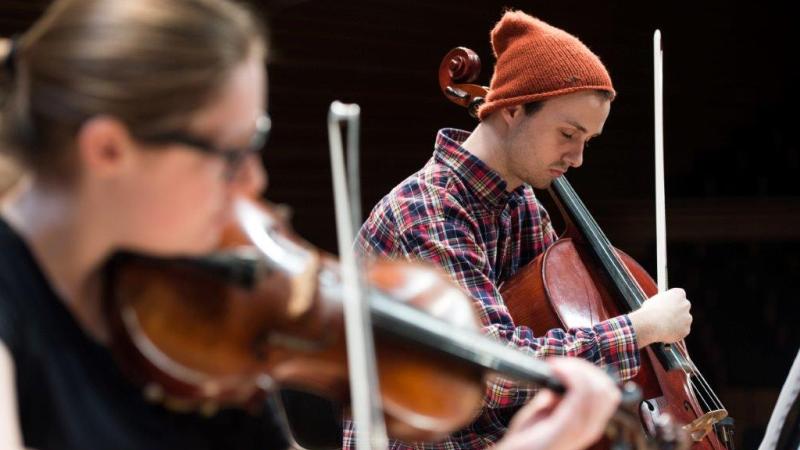School of Humanities, Arts, and Social Sciences To Offer Private Music Lessons for Rensselaer Students
October 26, 2016

Troy, N.Y. — With sophisticated performance spaces, seasoned music faculty, and exciting new course offerings, the School of Humanities, Arts, and Social Sciences (HASS) at Rensselaer Polytechnic Institute is working to raise the performance level of music ensembles and enrich Rensselaer students’ outlets for creative expression. Beginning in spring 2017, the Department of Arts will offer private music lessons for instrumentalists and singers.
“We have a lot of students already happily living between the left and right brain—what I’m calling the sweet spot,” said HASS Dean Mary Simoni. “They might have studied piano for a number of years, and they come here and still want to keep up their music.” Simoni herself inhabits that “sweet spot.” As a technologically savvy composer, arts administrator, pianist, and music theorist, she understood Rensselaer needed a 21st century music program to underpin and interact with the experimental new media. “As the music program expands at Rensselaer, we will continue to experience more sophisticated interdisciplinary musical performances,” she said.
“When students come to college, they think that they’re too busy to continue their love of music. They leave their instruments at home, and don’t think there are opportunities at Rensselaer,” says Curtis Bahn, composer and graduate program director in the Department of the Arts. “One of the first things we ask them is whether they had a music involvement that they stopped when they went to college. We encourage them to get their instrument out, brush it off, and start practicing.”
Bahn is part of a HASS faculty committee working to develop the undergraduate music program. The effort is part of a larger campuswide initiative, led by President Shirley Ann Jackson and supported by HASS Dean Mary Simoni, to use the arts to enhance students’ capacity in their chosen majors, from mathematics to biology to engineering.
Called Art_X@Rensselaer, the initiative infuses education with the arts—by offering more opportunities to study artistic disciplines, like music, while expanding pedagogy and research with arts-inspired approaches to conceptual thinking. “Art_X is designed to help all of our students to see the art in, and of, science, and the science in, and of, art,” said President Shirley Ann Jackson.
Art_X learning opportunities are now being introduced throughout the curriculum, from interdisciplinary lectures at the Curtis R. Priem Experimental Media and Performing Arts Center (EMPAC) and the Center for Biotechnology and Interdisciplinary Studies (CBIS), to incorporating design considerations into engineering courses. But it might be said the initiative is rooted in earlier decisions to further develop music at Rensselaer.
Since joining Rensselaer, Simoni has been investigating the existing Rensselaer music culture, supported by faculty with wide-ranging interests and expertise. In addition to Bahn, who also has formal training in Hindustani music and the sitar, music-related faculty include Professor Michael Century, a renowned composer who studied with Nadia Boulanger in Paris and is also a jazz pianist, accordionist, and critical theorist who is leading the effort to seek accreditation for the new degree; Associate Professor Tomie Hahn, an ethnomusicologist with expertise in Japanese culture; Assistant Professor Robert Hamilton, who specializes in gaming and live electronics; Professor of Practice Eddie Ade Knowles, who specializes in African, Afro-Cuban, and New World percussion; and Professor of Practice Pauline Oliveros, an internationally renowned composer and founder of the Deep Listening Institute.
In addition, when Nicholas DeMaison was hired in 2013, he brought the Rensselaer Orchestra and the Concert Choir forward to be offered as classes, added in a Chamber Ensemble course that could accommodate various iterations of smaller groups, and began developing and conducting a concert series each semester.
“Having an orchestra and a choir and a chamber program that are functioning at a high level is really important for letting people know that we take all of this seriously,” said DeMaison. “In a way it’s a flagship endeavor, but it’s actually just sort of to the side of the focus.”
The ensembles are only the beginning, however, of how Rensselaer students can participate in the creative and collaborative possibilities of music making. The learning experience of contributing one part to a musical whole is one of the cognitive benefits of playing music, particularly for students who will find themselves in what Simoni calls a “trans-disciplinary” field such as biomedical engineering.
Advance registration for the private music lessons is required. Once enrolled, the program will consist of 50-minute lessons for a 15-week period. Participating students will receive one academic credit per semester. A supplementary lab charge will be applicable. In order to assess hiring needs and interest, students are encouraged to complete an online survey. To view the survey, visit: http://bit.ly/2euUggz.
The upcoming private music lessons are vital to The New Polytechnic, an emerging paradigm for teaching, learning, and research at Rensselaer. The New Polytechnic is transformative in the global impact of research, in its innovative pedagogy, and in the lives of students at Rensselaer.
Note
Excerpts of this release are from the Spring 2016 Alumni magazine story, titled “Music To Our Ears.” To read the full story, visit: http://bit.ly/2egDDEg.
About Rensselaer Polytechnic Institute
Rensselaer Polytechnic Institute, founded in 1824, is America’s first technological research university. The university offers bachelor’s, master’s, and doctoral degrees in engineering; the sciences; information technology and web sciences; architecture; management; and the arts, humanities, and social sciences. Rensselaer faculty advance research in a wide range of fields, with an emphasis on biotechnology, nanotechnology, computational science and engineering, data science, and the media arts and technology. The Institute has an established record of success in the transfer of technology from the laboratory to the marketplace, fulfilling its founding mission of applying science “to the common purposes of life.” For more information, please visit http://www.rpi.edu.